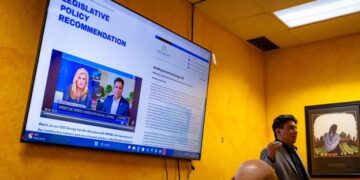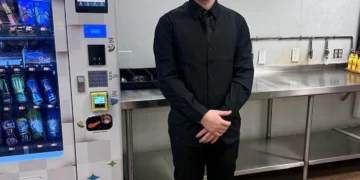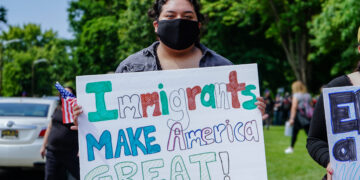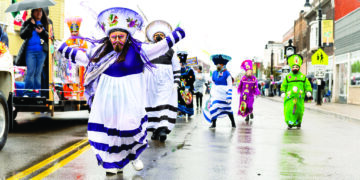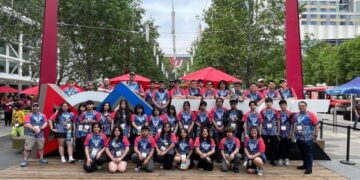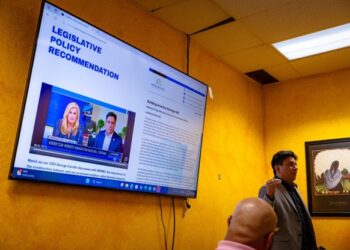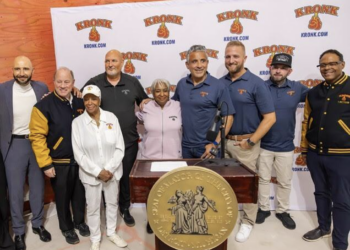The following interview was conducted by EL CENTRAL Hispanic News freelance writer Estefania Arellano-Bermudez who is a regular contributor to El CENTRAL and Planet Detroit. Governor Whitmer discussed environmental justice matters, the Drive SAFE bill, and more. The Governor’s office reached out to EL CENTRAL for this phone interview in celebration of National Hispanic Heritage Month.
EL CENTRAL: Hello Governor and thank you so much for taking the time to speak with us today.
Governor Whitmer: Of course. Happy to Estefania.
EL CENTRAL: The minimum wage for tipped workers in Michigan will be completely phased out through 2029 and raised to the state minimum wage. So, I know that some restaurants are against this and some say they might have to close. Given this concern, are you considering any changes to the new law before it takes effect in early 2025?
Gov. Whitmer: Well, I think it’s important first to start with happy Hispanic Heritage Month. So, I just want to make sure I get that in. It’s important to remember that the people of Michigan had an opportunity to vote and they voted to raise the minimum wage. The Republican led legislature many years ago undercut that effort and that’s why we’re in the moment that we are in because the lawsuit was just decided. We’re still working to make sure we understand the impact of the lawsuit and how this law is going to be applied. So, there’s still a lot of concern and lack of clarity and we are working to make sure we understand the implications and the impact of the lawsuit before we even start to discuss whether or not there’s potential legislative action that should be taken.
EL CENTRAL: You have supported Michigan driver’s licenses for undocumented immigrants in the past. Can you give our readers an update on the Drive Safe bill?
Gov. Whitmer: I do think that the drive safe bill is one that is working its way through the legislature. It is really, I believe, crucial that people have the ability to access an identification from the state. And so this is something that as the legislature returns in the fall, I anticipate it could be on the list of actions that they may take before the end of the year.
EL CENTRAL: Waste from the Manhattan Project is being brought into Wayne County, Belleville, Michigan, near Detroit. This is an environmental justice issue. What regulations are being put into place to make sure it is not open season?
Gov. Whitmer: So obviously we want to make sure that Michiganders are safe. That is the most important job of government in my estimation. And so we’re looking very critically at all ways that we can improve safety in Michigan. There are a lot of longstanding things that are contributing to this particular issue and one that we are working with our departments to make sure that we’ve got accurate information so that we can chart a path going forward.
EL CENTRAL: Given the influx of Latinos in Michigan, how will you encourage Latino engagement on all levels, especially now that we’re coming up to an election? And how will you ensure representation in your policy decisions and campaign priorities?
Gov. Whitmer: Well, one of the things that I’m really grateful for and proud of is the ways that we have enhanced and increased Latino representation in government from people who are in my cabinet to people who are on my staff to voices in the community that we’ve elevated, working with Hispanic chambers of commerce and always trying to stay very close to the community so that when we are making decisions that impact people’s lives, that the Hispanic community is well-represented and considered in all things. So this is a community that has contributed to our economy, our cultural diversity, and every one of us benefits from the Hispanic community in Michigan. And so making sure that we grow this community and support the community and make it easier for entrepreneurs to start their business and be successful is really important to me personally, but it’s important to our state.
EL CENTRAL: And my last question is regarding the influx of Venezuelan immigrants and especially in Detroit, you have previously said that Michigan is a welcoming state. What initiatives are in place to help integrate immigrants into local communities, including access to quality education, healthcare, and employment?
Gov. Whitmer: So, there are a number of things that we’ve done to create opportunity for people who call Michigan Home. Regardless of how long you’ve called Michigan home, we want to make sure that you can be successful here. Whether it’s the historic funding that we have put into our education system for English language learners to just the general per pupil foundational allotment to addressing shortcomings in some communities where there were, I think, funding imbalances. And so we’ve really worked to create equitable opportunities across Michigan. We also know that right now there is a very, I think, destructive conversation happening around immigrants in our country. And so being very mindful about inclusivity and supporting this community as well as other immigrant communities is really important. That’s what built the auto industry. It’s what has contributed to our collective economic success, and it’s going to be absolutely essential as we think about the future.
State Officials Celebrate Hispanic Heritage Month
Governor Gretchen Whitmer recognized September 15 through October 15 as Hispanic Heritage Month in Michigan, celebrating the rich history, culture and contributions of Hispanic Americans in shaping Michigan’s diverse communities.
“Hispanic Heritage Month is a time to celebrate the legacy and vibrant culture that Hispanic Americans bring to our nation and state,” said Governor Whitmer. “From arts, and education to business and public service, Hispanic communities play an essential role in the fabric of Michigan. Their achievements and contributions continue to propel us forward. As we honor this month, let us continue to build a state that reflects the values of equity, inclusion, and opportunity for all.”
“Hispanic Michiganders make incredible contributions to our art, culture, music, cuisine, and so much more,” said Lt. Governor Garlin Gilchrist II. “I hope every Michigander takes time to celebrate Hispanic Heritage Month.”
“I am honored to highlight and uplift the accomplishments of those in the Hispanic and Latinx Communities, especially during Hispanic Heritage Month” said Senator Mary Cavanagh (D-Redford Township), Chair of the Legislative Latino Caucus. “As Michigan’s fastest growing population, we deserve a seat at the table, and myself, along with other Latino Leaders, are ensuring our voices are heard throughout Michigan’s legislative and budget process. The contributions of Hispanic and Latinx Americans can be felt in every corner of our state and communities. It is an honor to celebrate and highlight those contributions by investing in historically underserved communities and showcasing opportunities for future Latinx leaders.”
“Every day, my work is informed by the Latinos who came before me and focused on creating a better Michigan for those who will come after me,” said state Senator Darrin Camilleri (D-Trenton), Vice-Chair of the Michigan Legislative Latino Caucus. “I am grateful for my Hispanic heritage and all of the diverse people and cultures that make our state such a great place to live.”
“Hispanic Heritage Month is a time for us to remember and celebrate all of the amazing contributions members of the Latin American communities have made to the United States’ history and culture,” said state Rep. Veronica Paiz (D-Harper Woods). “From housing to health care access, Latinos are key in shaping policies that benefit all Michiganders. ”
Governor Whitmer has worked to ensure appointees reflect Michigan’s diverse population. Governor Whitmer has appointed 70 Hispanic and Latino Michiganders who are currently serving on various boards and commissions. She has also appointed an additional 10 representatives to serve in 2024.
Michigan joins the nation in commemorating the enduring influence of Hispanic Americans. Hispanic Americans have provided Michigan and the United States with unique social and cultural influences, fundamentally enriching the extraordinary character of our state and nation. The state appreciates the countless achievements of Hispanic Americans and continues our efforts to ensure that Michigan is a welcoming and inclusive place that provides just and equal opportunities for all.
Governor Whitmer’s Historic Wins for the Hispanic Community Across Michigan:
• Powered the Office of Global Michigan by increasing their budget 30x, from $500,000 to $15 million, and worked with them to reduce issues complicating immigration channels and assist newcomers with citizenship and acclimation.
• Secured $10 million in ongoing funding for the racial disparities task force, working to create stronger communities by expanding access to healthcare, economic opportunities, and more.
• Quintupled working families tax credit, giving over 700,000 Michigan families an average tax refund of $3,150. This is extra cash for groceries, gas, school supplies, and more.
• Hispanic Latino Commission outlined a strategic plan to grow investments in education, workforce and economic development, health, housing, community investment, and public safety.
• Increased funding for English language learners in schools.
• Put tens of thousands of Michiganders on a tuition-free path to higher education through Michigan Reconnect and lowered the cost of college by thousands for 7/10 graduating seniors with the Michigan Achievement Scholarship.
• Secured the funding for a $2.6 million capacity building grant for the Latinx Technology & Community Center in Flint.
• Invested $5 million to support capital improvements for the West Michigan Hispanic Chamber.



